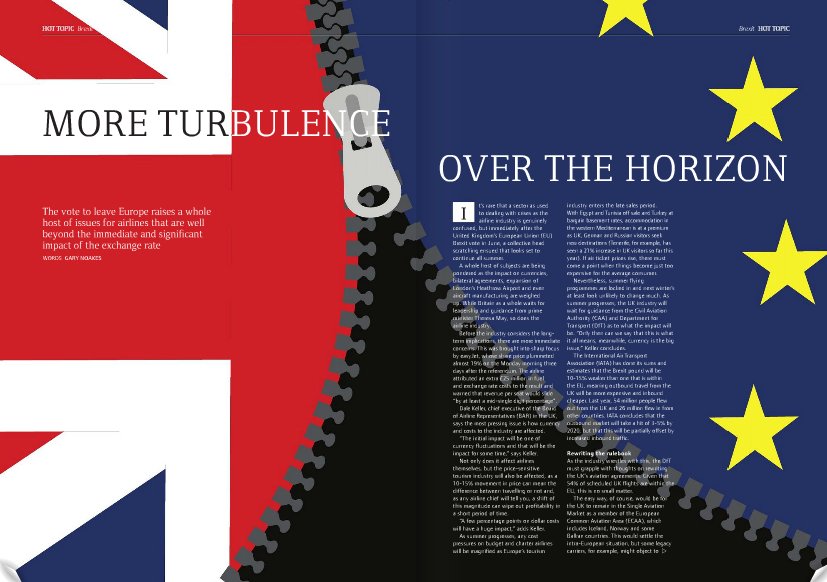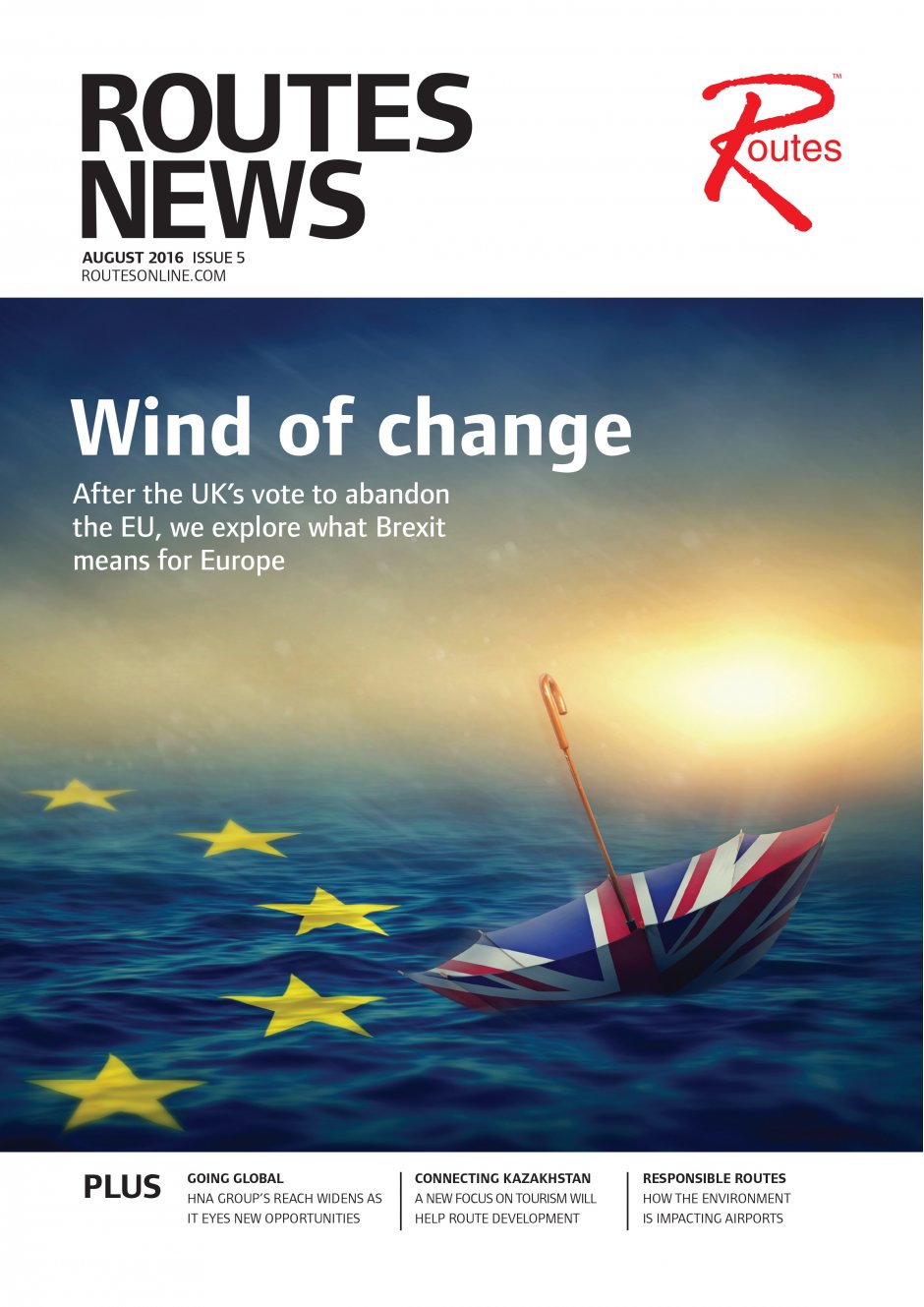It’s rare that a sector as used to dealing with crises as the airline industry is genuinely confused, but immediately after the United Kingdom’s European Union (EU) Brexit vote in June, a collective head scratching ensued that looks set to continue all summer.
A whole host of subjects are being pondered as the impact on currencies, bilateral agreements, expansion of London’s Heathrow Airport and even aircraft manufacturing are weighed up. While Britain as a whole waits for leadership and guidance from prime minister Theresa May, so does the airline industry.
Before the industry considers the long-term implications, there are more immediate concerns. This was brought into sharp focus by easyJet, whose share price plummeted almost 19% on the Monday morning three days after the referendum. The airline attributed an extra £25 million in fuel and exchange rate costs to the result and warned that revenue per seat would slide “by at least a mid-single digit percentage”.
Dale Keller, chief executive of the Board of Airline Representatives (BAR) in the UK, says the most pressing issue is how currency and costs to the industry are affected. “The initial impact will be one of currency fluctuations and that will be the impact for some time,” he says.
Not only does it affect airlines themselves, but the price-sensitive tourism industry will also be affected, as a 10-15% movement in price can mean the difference between travelling or not and, as any airline chief will tell you, a shift of this magnitude can wipe out profitability in a short period of time. “A few percentage points on dollar costs will have a huge impact,” adds Keller.
As summer progresses, any cost pressures on budget and charter airlines will be magnified as Europe’s tourism industry enters the late sales period. With Egypt and Tunisia off sale and Turkey at bargain basement rates, accommodation in the western Mediterranean is at a premium as UK, German and Russian visitors seek new destinations (Tenerife, for example, has seen a 21% increase in UK visitors so far this year). If air ticket prices rise, there must come a point when things become just too expensive for the average consumer.
Nevertheless, summer flying programmes are locked in and next winter’s at least look unlikely to change much. As summer progresses, the UK industry will wait for guidance from the Civil Aviation Authority (CAA) and Department for Transport (DfT) as to what the impact will be. “Only then can we say that this is what it all means, meanwhile, currency is the big issue,” Keller concludes.
The International Air Transport Association (IATA) has done its sums and estimates that the Brexit pound will be 10-15% weaker than one that is within the EU, meaning outbound travel from the UK will be more expensive and inbound cheaper. Last year, 54 million people flew out from the UK and 26 million flew in from other countries. IATA concludes that the outbound market will take a hit of 3-5% by 2020, but that this will be partially offset by increased inbound traffic.
Rewriting the rulebook
As the industry wrestles with this, the DfT must grapple with thoughts on rewriting the UK’s aviation agreements. Given that 54% of scheduled UK flights are within the EU, this is no small matter.
The easy way, of course, would be for the UK to remain in the Single Aviation Market as a member of the European Common Aviation Area (ECAA), which includes Iceland, Norway and some Balkan countries. This would settle the intra-European situation, but some legacy carriers, for example, might object to giving easyJet free passage given how successful the airline has been in some EU states.
If the UK joins the ECAA, one thing airlines won’t be escaping is the continued adoption of EU regulations, including consumers’ rights under EU 261, which are a condition of acceptance. A lot depends on how rancorous the departure from the EU is as to whether there is effectively just a name change above the door or whether agreements are ripped up completely.
As in the referendum campaign, immigration may play a big part, since if the UK insists on restricting the freedom of movement and right to work of EU citizens following Brexit, then the EU can choose not to ratify the UK’s ECAA membership or separate bilateral treaties.
There could be some long discussions in Brussels over the next few years. Then there is the question of bilaterals with non-EU countries. The UK’s most important long-haul air routes are to the US, particularly New York.
These are covered by an EU-US open skies agreement that will no longer be negotiated collectively by Brussels. In the case of the US, the “horizontal agreement” that now applies replaced the Bermuda II deal, based on an original agreement struck in the 1950s. A return to this agreement would be unthinkable as, for example, it barred Delta Air Lines from London’s Heathrow Airport until 2008. However, future discussions may have to revert to old style bilateral negotiations.
During the referendum campaign a few airlines said they would consider moving their operating bases to an EU country, so now Brexit has actually happened, what are they thinking? bmi regional was one, but Jochen Schnadt, bmi regional’s COO, says the approach is very much “wait and see”.
“Until we know what is going to happen, nothing is going to happen.” But he says: “We are pursuing a pan-European strategy – almost 50% of our capacity is outside the UK. If there are any impediments we will look at what we have to do – will we need another Airport Operator’s Certificate (AOC) in an EU country?”
Schnadt believes leisure traffic may take a dip because of price pressure, but that business fliers present “no immediate issues” and says bmi regional is well hedged. The Austrian adds he would be “very surprised” if the industry faced difficulties over workers’ citizenship post-Brexit.
Ryanair, with its Irish AOC, is naturally more forthright, saying that none of its new aircraft will now be placed in the UK. It is possibly best placed for Brexit, although the UK provides 40% of its sales, the EU is still a market of 440 million, so there is plenty of new ground to capture in the unlikely event that a solution cannot be found to enable it to continue its UK-based business.
Dramatic changes seem certain at some point, but for the moment only one thing is sure: Brexit will not be as swift as England’s departure from Euro 2016 and so, on a whole raft of issues, the industry faces months and perhaps years of negotiations.
What now for Heathrow Airport?
One immediate effect of Brexit may be to close the door on expansion of London’s Heathrow Airport. If there is an award for optimism in the business world following Brexit, the airport must surely be a contender. Only 48 hours after the referendum
result was known, Heathrow issued a press release saying it was “time to get back to business” and approve a third runway. Unfortunately for the airport, expansion is unlikely to be near the top of new prime minster Theresa May’s to-do list, with the decision now delayed until “at least” October.
The delay means a decision will come at least 18 months after the Davies Commission report. Many are frustrated and for John Grant, industry analyst at airline guide OAG, this really is the big issue in the immediate post referendum period. “Brexit does not in any way undermine the need for additional capacity in London and the south-east, and it would be disappointing to see this result used as a reason to delay any decision,” he says.
Heathrow chief executive John Holland-Kaye argues that only Heathrow can help Britain “be the great trading nation connecting all regions of the UK to the world” – but has otherwise declined to comment.
It might make him feel better if he considers Gibraltar, where 96% of residents voted to remain. Gibraltar’s airfield is owned by the UK’s Ministry of Defence and its airport terminal by the Gibraltan government, which might make for some interesting negotiations with Spain over air traffic rights. A Gibraltan government spokesperson would not be drawn. “People should not expect any dramatic changes for a considerable period of time,” he said.
 |
This article is modified from an original feature that appeared in... ROUTES NEWS - ISSUE 5, 2016 PLEASE CLICK HERE to view the magazine. |
 |





